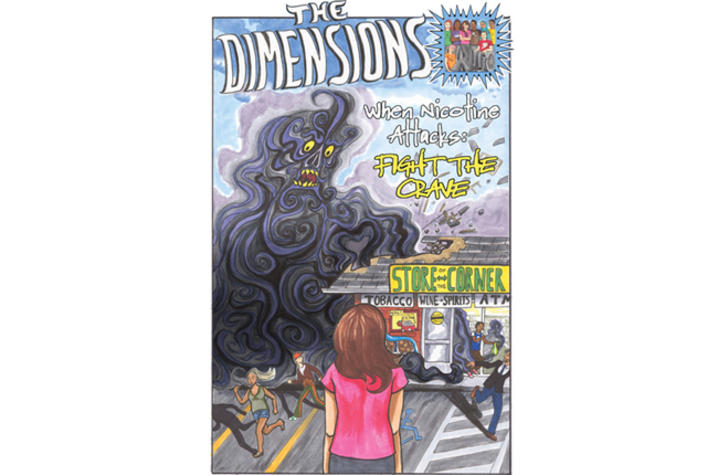College of Nursing Researchers Release "Fight the Crave" Comic for Smoking Cessation
The University of Kentucky Public Relations & Strategic Communications Office provides a weekly health column available for use and reprint by news media. This week's column is by Zim Okoli, Ph.D., executive director of Mental and Behavioral Health, BH WELL at the University of Kentucky College of Nursing with a joint appointment at Eastern State Hospital as director of Tobacco Treatment Services and Evidence Based Practice; and Heather Robertson, MPA, director of BH WELL Executive Operations with a joint appointment at Eastern State Hospital as director of Tobacco Treatment Services and Evidence Based Practice Operations.
LEXINGTON, Ky. (March 19, 2021) — March 20 is National Kick Butts Day, a time to raise awareness of the health effects of cigarettes and nicotine products and take action to lower one’s risk. People living with mental illness use tobacco at higher rates than the general population. With the recent COVID-19 pandemic, healthcare providers are seeing heightened levels of mental illnesses and an increasing number of people needing mental health support. Thus, the need for improved mental health education and the normalization of mental health seeking behaviors are extremely important.
Kentucky leads the nation in the number of new cases and deaths from lung cancer. While tobacco use among people without serious psychological distress has decreased from 24.1% to 18.2%, tobacco use among people with serious psychological distress has only gone from 43.6% to 42.1%. Tobacco use among individuals living with schizophrenia, bipolar disorder and other serious mental illnesses is even higher, up to 70% in some cases.
Individuals living with mental illnesses who use tobacco are more likely to die as much as ten to 25 years earlier,experience more depression and anxiety, have more heart and breathing challenges and are more likely to die by suicide. While some people believe that tobacco use can calm anxiety and help recovery, tobacco use actually hinders recovery.
Researchers in the UK College of Nursing created “When Nicotine Attacks: Fight the Crave” comic book. This is the first of eight in a series that focus on how treatment is often tailored to better serve individuals living with mental and behavioral health challenges.
With comic books, researchers and healthcare providers can share what they have learned with people living with mental illnesses who are trying to quit tobacco and other nicotine products in a meaningful and impactful way. It is a way to share real-life solutions based on what is shown to work in a form that is entertaining and fun. In the first comic, more than 50 years of the science of tobacco control is shared as well as the evidence that guides tobacco treatment into relatable characters to support people struggling with the same issues.
If you or someone you love is struggling with tobacco use addiction, specifically if that person is living with a mental illness, treatment and recovery are within reach. Everyone who overcomes an addictive process is a superhero. It takes great inner strength to seek help and receive support to recover from an addiction. We all can lend support to others when the need arises in a way that supports their own path to recovery.
The Behavioral Health Wellness Environments for Living and Learning (BH WELL) research program offers free educational resources to people living with or experiencing mental and behavioral health challenges and to behavioral health care providers. For more information, check out our many mental and behavioral health resources at https://www.uky.edu/bhwell/.
As the state’s flagship, land-grant institution, the University of Kentucky exists to advance the Commonwealth. We do that by preparing the next generation of leaders — placing students at the heart of everything we do — and transforming the lives of Kentuckians through education, research and creative work, service and health care. We pride ourselves on being a catalyst for breakthroughs and a force for healing, a place where ingenuity unfolds. It's all made possible by our people — visionaries, disruptors and pioneers — who make up 200 academic programs, a $476.5 million research and development enterprise and a world-class medical center, all on one campus.






